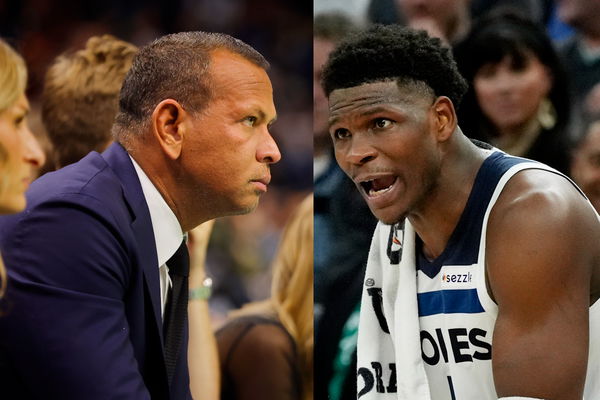
via Imago
Credit-Imagn Images

via Imago
Credit-Imagn Images
It was a regular day for Alex Rodriguez on March 27, 2024. The former MLB star had his usual start to the day at his Coral Gables mansion, in Florida, before the doomed news hit him like a brick. That wasn’t supposed to happen. He was the owner of both Minnesota’s basketball teams, which are among the biggest luxuries one can afford. Yet, things went wrong. “The Timberwolves and Lynx are no longer for sale,” Glen Taylor’s statement read, sweeping the mat from under his feet and of Marc Lore, his business partner and co-owner of the Timberwolves and Lynx. Since then, tux-clad lawyers have waged a battle in the courtroom. And now the end is finally in sight.
The Timberwolves and Lynx ownership tussle should be settled either Friday or Monday, sources close to the team confirmed to The Minnesota Star Tribune. After the arbitration in November, the three-member panel has reached a conclusion that should confirm the ownership rights.
The current owner, Glen Taylor, and the contesting party of Rodriguez and Lore’s representatives presented their cases in November after the dispute clouded the future of Anthony Edwards and Co. Taylor’s vision of win-now was seen as a much more aggressive one, counter to Rodriguez’s future-first approach. With Rudy Gobert, Julius Randle, and Anthony Edwards on max deals, plus Jaden McDaniels, Naz Reid, and Mike Conley pinching sizable deals, the Timberwolves cap situation boiled over.
ADVERTISEMENT
Article continues below this ad
The franchise is currently spending $26.9 million over the first tax apron and $16.1 million above the second apron. The Collective Bargaining Agreement has ensured the impending penalties that will come with it, such as trade restrictions and salary moderation.
Alex Rodriguez has an eye on that. Speculation ran rampant over potential cost-cutting once he gained full control. That puts Anthony Edwards and Gobert at serious risk of being traded away from the franchise as they look to steady the financial board. The latest Luka Doncic trade showed the league how anyone and everyone is dispensable and Ant won’t be saved if needs arise.
But how did this dispute begin, and what exactly happened between the contesting parties? A deeper inspection should help to understand the situation.
ADVERTISEMENT
Article continues below this ad
Alex Rodriguez and Marc Lore vs Glen Taylor, an ugly saga of the NBA’s major power struggle
Back in 2021, when the deal between A-Rod and Taylor was finalized, it had a clause. It allowed the overtaking party to pay in portions over multiple years before a majority of ownership status was reached. When Taylor canceled the sale, Lore and Rodriguez were trying to secure financing on a final call option of a 40% ownership stake from the current owner that would have given them majority ownership of both teams. The basic concept of the trial was whether Taylor had the right to cancel the sale.
The final call option was scheduled for Dec. 31, 2023. It needed to be finalized “not more than ninety days” later, according to the purchase agreement. It was widely reported that Rodriguez’s side lost funding from private equity firm Carlyle not long before those 90 days were up. However, A-Rod’s party had the option to extend that period for ninety additional days only if “NBA Approvals or other required approvals of any Governmental Entity have not yet been obtained.”
What’s your perspective on:
Is Glen Taylor's backtrack on the sale a smart move or a case of seller's remorse?
Have an interesting take?
“We have fulfilled our obligations, have all necessary funding and are fully committed to closing our purchase of the team as soon as the NBA completes its approval process,” Rodriguez and Lore said in a statement. “Glen Taylor’s statement is an unfortunate case of seller’s remorse that is short-sighted and disruptive to the team and the fans during a historic winning season.”
ADVERTISEMENT
Article continues below this ad
Taylor’s decision might have been influenced by the serious flow of cash in the NBA ownerships since he made the deal. At the time, Taylor sold the teams for an estimated $1.55 billion, at least $800 million below an average NBA team’s valuation. Mat Ishbia bought the Suns in 2022 for $4 billion and Michael Jordan sold the Hornets for $3 billion the next year.
Now the Celtics are up for sale and the projected pocket pinch for the NBA champions is somewhere between $5-$6 billion. The staggering difference could be a deciding factor in Taylor backtracking on his sale. But now the future of the Timberwolves and the Lynx depends on the verdict provided by Kathleen Blatz, Thomas Fraser, and Joseph R. Slights III’s arbitration panel as the highly-anticipated decision looms.
ADVERTISEMENT
ADVERTISEMENT
ADVERTISEMENT
ADVERTISEMENT


Is Glen Taylor's backtrack on the sale a smart move or a case of seller's remorse?